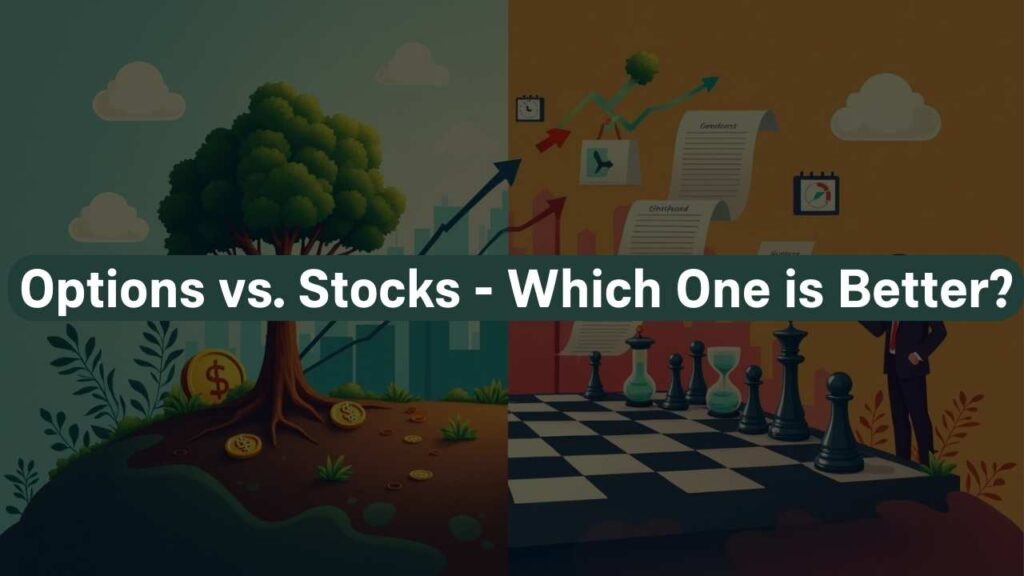Investing can be exciting but intimidating, especially when confronted with choices like stocks and options. Both instruments present different opportunities, yet they appeal to other strategies, risk appetites, and experience levels.
Stocks are usually the gateway for beginners, representing ownership in companies, while options are complex derivatives that offer flexibility through contracts tied to stock prices. Which is better? The answer isn’t one-size-fits-all. This blog breaks down their differences, pros, and cons to determine which one lines up with your financial goals better.
Options vs. Stocks

| Aspect | Stocks | Options |
|---|---|---|
| Definition | Ownership in a company. | Contracts granting buying/selling rights. |
| Ownership | Shareholders own equity. | No ownership; contractual rights. |
| Risk Level | Moderate (long-term). | High (leverage, time decay). |
| Profit Potential | Unlimited upside (theoretically). | High (leveraged gains) but capped. |
| Time Sensitivity | No expiration. | Expiration dates dictate strategy. |
| Complexity | Simple (buy/hold/sell). | Complex (strategies, terminology). |
| Capital Required | Higher upfront cost (per share). | Lower premium (leverage). |
| Suitability | Long-term investors, beginners. | Experienced traders, hedgers, speculators. |
Key Differences Explained
- Ownership vs. Contracts
- Stocks: Buying shares makes you a partial company owner, entitled to dividends and voting rights.
- Options: These are contracts. Calls (right to buy) and puts (right to sell) derive value from underlying stocks but don’t confer ownership.
- Risk and Reward
- Stocks: Risk is tied to company performance. Losses are limited to your investment. Long-term growth potential is significant (e.g., Apple, Amazon).
- Options: Higher risk due to leverage and expiration. Profits can be magnified, but contracts can expire worthless, leading to 100% loss on premiums.
- Time Sensitivity
- Options: Expiration dates force strategic timing. Theta (time decay) erodes value as expiration nears.
- Stocks: No time constraints. Investors can hold indefinitely.
- Complexity
- Options: Require understanding strike prices, expiration, and strategies like spreads or straddles.
- Stocks: Straightforward—buy low, sell high.
- Capital and Leverage
- Options: Lower upfront cost (premiums) for controlling 100 shares, offering leverage. However, losses can exceed initial investment in advanced strategies.
- Stocks: Full share price paid upfront, limiting leverage but capping risk.
Which One is Better for Beginners?
Beginners typically find stocks easier to understand since they involve straightforward ownership. Options require more expertise due to factors like expiration dates and strike prices.
- If you prefer simplicity, stocks are the better choice.
- If you enjoy learning advanced trading strategies, options can be profitable.
Which One is Better for Experienced Investors?
For experienced investors, options provide an opportunity to leverage capital and earn higher returns. However, they also require a strong understanding of risk management. Stocks, on the other hand, remain a stable and reliable long-term investment.
When to Choose Stocks
- Long-Term Growth: Ideal for retirement accounts or wealth-building over decades.
- Dividend Income: Companies like Coca-Cola or Procter & Gamble offer steady dividends.
- Lower Risk Tolerance: Less volatility compared to options.
- Passive Investors: Minimal monitoring required.
When to Choose Options
- Hedging: Protect stock portfolios from downturns (e.g., buying puts).
- Speculation: Capitalize on short-term price movements with limited capital.
- Income Generation: Sell covered calls to earn premiums on owned stocks.
- Advanced Strategies: Use spreads or iron condors for defined risk/reward scenarios.
Conclusion
Neither options nor stocks are inherently “better”—they serve different purposes. Stocks suit long-term investors seeking stability and growth, while options appeal to traders comfortable with risk and complexity. Beginners should start with stocks to build foundational knowledge before exploring options. Always assess your financial goals, risk tolerance, and time horizon. Consulting a financial advisor can further tailor strategies to your needs.
FAQs: Options vs. Stocks – Which One is Better?
What exactly are options?
Options are contracts granting the right (not obligation) to buy (call) or sell (put) a stock at a set price by a specific date.
Which is riskier: options or stocks?
Options are riskier due to expiration, leverage, and potential for total loss of premium. Stocks carry market risk but no expiration.
Can I lose more money than I invest in options?
Yes, in advanced strategies like selling naked calls/puts. However, buying calls/puts limits loss to the premium paid.
Are options suitable for beginners?
Not initially. Start with stocks, then learn options gradually using paper trading or small positions.
Can I use both options and stocks together?
Absolutely! Covered calls (selling calls on owned shares) or protective puts (buying puts as insurance) blend both instruments.
Do options always expire worthless?
No, but most do. Success requires accurate price and timing predictions.
How much capital do I need to start trading options?
It varies. Some brokers allow options trading with smaller accounts, but ensure you understand risks first.











